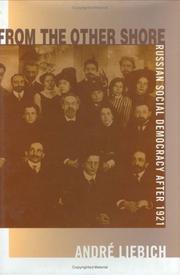| Listing 1 - 10 of 25 | << page >> |
Sort by
|

ISBN: 0521219868 Year: 1979 Publisher: Cambridge Cambridge University Press
Abstract | Keywords | Export | Availability | Bookmark
 Loading...
Loading...Choose an application
- Reference Manager
- EndNote
- RefWorks (Direct export to RefWorks)

ISBN: 9027709238 9400993854 9400993838 Year: 1979 Publisher: Dordrecht
Abstract | Keywords | Export | Availability | Bookmark
 Loading...
Loading...Choose an application
- Reference Manager
- EndNote
- RefWorks (Direct export to RefWorks)

ISBN: 0674325176 Year: 1997 Volume: 125 Publisher: Cambridge, Mass. ; London Harvard University Press
Abstract | Keywords | Export | Availability | Bookmark
 Loading...
Loading...Choose an application
- Reference Manager
- EndNote
- RefWorks (Direct export to RefWorks)
Mensheviks --- Socialist parties --- History. --- History --- Soviet Union --- Mensheviks - History. --- Socialist parties - Soviet Union - History.
Book
ISBN: 2825705446 9782825705445 Year: 1997 Volume: *1 Publisher: Genève: Georg,
Abstract | Keywords | Export | Availability | Bookmark
 Loading...
Loading...Choose an application
- Reference Manager
- EndNote
- RefWorks (Direct export to RefWorks)
Minorities --- Minorités --- Minorites --- Postcommunisme --- Minorités --- Europe [Eastern ] --- Europe [Central ] --- Politics and government --- 1989 --- -Europe [Eastern ] --- -Citizenship --- Citizenship --- Minorites - Europe centrale --- Minorites - Europe de l'Est --- Postcommunisme - Europe centrale --- Postcommunisme - Europe de l'Est
Book
ISBN: 3030839923 3030839931 9783030839925 9783030839925 Year: 2022 Publisher: Cham: Palgrave Macmillan, Springer Nature Switzerland,
Abstract | Keywords | Export | Availability | Bookmark
 Loading...
Loading...Choose an application
- Reference Manager
- EndNote
- RefWorks (Direct export to RefWorks)
Europe, Eastern - History - 1989 --- -Europe, Central - History - 1989 --- -Europe, Eastern - Politics and government - 1989 --- -Europe, Central - Politics and government - 1989 --- -Europe, Eastern - Social conditions - 1989 --- -Europe, Central - Social conditions - 1989 --- -Europe, Eastern - History - 1989 --- -Europe, Eastern --- Europe, Central --- Europe, Eastern
Book
Year: 1996 Publisher: Paris: Société d'études historiques des relations internationales contemporaines,
Abstract | Keywords | Export | Availability | Bookmark
 Loading...
Loading...Choose an application
- Reference Manager
- EndNote
- RefWorks (Direct export to RefWorks)
Book
ISBN: 1003274366 1000614107 1000614115 1003274366 1032228245 1032228326 Year: 2022 Publisher: Milton Taylor & Francis Group
Abstract | Keywords | Export | Availability | Bookmark
 Loading...
Loading...Choose an application
- Reference Manager
- EndNote
- RefWorks (Direct export to RefWorks)
Multi
ISBN: 9783030839932 9783030839925 9783030839949 9783030839956 Year: 2022 Publisher: Cham Springer International Publishing, Imprint: Palgrave Macmillan
Abstract | Keywords | Export | Availability | Bookmark
 Loading...
Loading...Choose an application
- Reference Manager
- EndNote
- RefWorks (Direct export to RefWorks)
"Prof. Liebich depicts not only the history of post-communist regimes in Central-East Europe, but also these states' internal agendas and transformative debates. This book lives that history through telling it once again, thus challenging accepted prejudices." (Adrian Liviu Ivan, Professor, Babes-Bolyai University, Romania) "East Central Europe is again on the news. After the fall of the Berlin Wall the region was hailed as a liberal champion; now it is scorned as an illiberal one. This seemingly puzzling metamorphosis is explained in a thoughtful and entertaining way by a leading historian of the region. I highly recommend Liebich's book to all those interested in European politics and history." (Jan Zielonka, Professor of European Politics, University of Oxford (UK), and Professor of Politics and International Relations, University of Venice, Cá Foscari (Italy)) "Moving from the fall of the Berlin Wall in 1989 to the present day, this book traces the trajectory of the six East Central European former satellites of the Soviet Union (Poland, Hungary, the Czech Republic, Slovakia, Romania, Bulgaria) that have joined the European Union. It seeks in particular to explain these countries' disenchantment with the "return to Europe" in spite of their significant advances. The book proceeds country by country and then devotes chapters to some contemporary issues, such as minorities, migration, and the relations of these "new" members with the European Union as a whole. The book eschews theory and is intended for a general audience, including students at all levels in political science and history classes devoted to the EU and to contemporary Europe, and to an academic and practitioner audience interested in world affairs and the evolution of the European Union. The book strives to fill a persistent knowledge gap in the English-speaking world concerning East Central Europe, and to offer fresh insights about the region in the context of contemporary geopolitics." (André Liebich is Honorary Professor of International History and Politics at the Graduate Institute of International and Development Studies, Switzerland).
Political systems --- Politics --- History --- geschiedenis --- politiek --- wereldpolitiek --- Europese politiek --- Europe --- Europe, Eastern --- Europe, Central --- Politics and government
Book
Year: 1998 Publisher: San Domenico (FI) : European university institute,
Abstract | Keywords | Export | Availability | Bookmark
 Loading...
Loading...Choose an application
- Reference Manager
- EndNote
- RefWorks (Direct export to RefWorks)
Article
Abstract | Keywords | Export | Availability | Bookmark
 Loading...
Loading...Choose an application
- Reference Manager
- EndNote
- RefWorks (Direct export to RefWorks)
| Listing 1 - 10 of 25 | << page >> |
Sort by
|

 Search
Search Feedback
Feedback About UniCat
About UniCat  Help
Help News
News